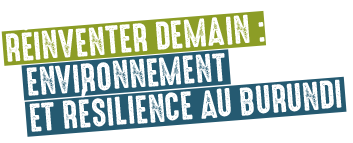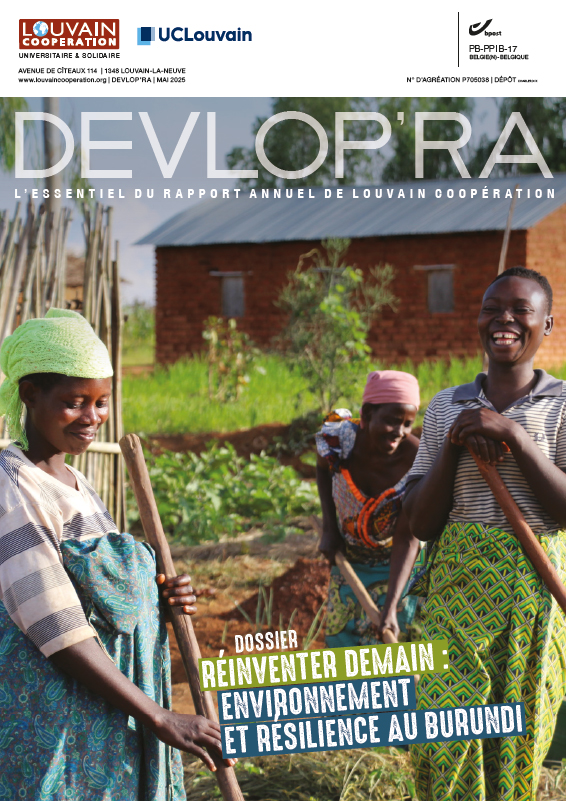


Edito
Impact Chronicles
Spring is always a special time at Louvain Coopération. It is a time to take stock of all the actions carried out during the previous year and to present our Activity Report. This raises some difficult choices: what to include? What to choose from the multitude of things we have accomplished? Which results to highlight? How can we best illustrate our impact and the changes it brings about in the populations and communities with which we work?
This year, we wanted to embrace change and present our ‘AR’ in a completely different way. It comes in the form of a Devlop'RA. This special edition features our annual results, presented according to the systemic approach and specific methodology of Louvain Coopération, which we have defined in order to better respond to today's global, complex and interconnected challenges. Our goal is to act on four systems – agriculture and food, health, entrepreneurship and education – and their interactions in order to strengthen the resilience of change agents and develop cross-cutting, coherent and sustainable responses. We also wanted to take advantage of this Devlop'RA to continue talking to you about the heart of our work. So we are heading to Burundi, where environmental challenges are compounded by the need to produce enough food to meet the needs of a growing population.
A dual objective, therefore: to present our overall impact and offer more content.
As with any change, doubts arise. How will this new format be received? We sincerely hope that yours will be warm. In any case, we are always open to your feedback.
We hope you enjoy reading this issue and thank you from the bottom of our hearts, because the projects featured in this first Devlop'RA exist thanks to your support.
Emilie Stainier
Communications Officer
2024 was a very active year for Louvain Coopération. Our organisation was strengthened by the merger with Geomoun and Rotary Clubs for Development. These mergers enabled us to increase our activities (+€1.3 million) in new areas and our impact on beneficiary populations. We are now present in Haiti and have expanded our activities to Benin and the DRC.
Our equity has also been strengthened (+€0.4 million), giving us a more solid financial footing. Louvain Coopération's activities continued to grow in 2024, mainly in Burundi with our PASCALE B biodiversity project and SESA project on the cassava value chain (+€0.7 million). We were also fortunate to begin a collaboration with the If! Foundation, which will strengthen and expand the work we are doing in northern Benin on access to healthcare.
In accordance with the new regulations in the OHADA countries where we operate (Benin, Togo, Democratic Republic of Congo), we have worked to implement the standards imposed by the Accounting System for Non-Profit Entities (SYCEBNL).
Dear Friends
The Louvain Coopération team is particularly proud of the year 2024, which we have just completed. After settling into a new working environment based primarily on the circular economy, we worked together to define our new Strategic Plan 2025-2036. Among other things, this document specifies two fundamental elements: our specific approach and our approach. The latter is intended to be systemic, focusing in particular on the interaction between the 4 systems in which we want to operate. These are sustainable food systems, inclusive entrepreneurial systems, resilient health systems and inclusive and equitable education systems. All of this, in well-defined geographical areas where we want to have a significant global impact.
Louvain Coopération has also remained open to the world and in 2024 absorbed two organisations that wanted to join us, namely the Brussels-based NGO Rotary Clubs for Development and the New Leuven-based NGO Geomoun. Each of them has added to our expertise, extended our areas of activity (the Batéké Plateau in the DRC and Haiti) and diversified our methods of intervention. These operations, which are quite innovative for the sector, also enable Louvain Coopération to grow and strengthen our societal base and our impact with vulnerable populations.
In a world that, dare we say it, has its head turned upside down, we need your support more than ever so that we can make the necessary changes to adapt and transform. Because with your help, we want to continue to support students searching for meaning in our universities, to co-create real opportunities for entrepreneurs, to promote access to mental health services for vulnerable populations, particularly young women, or to develop efficient, profitable farming practices that respect biodiversity.
From the bottom of my heart, thank you for your interest and enjoy this reading time.
Jean-Michel Pochet
Chief Executive Officer
Every year, Burundi's natural resources suffer as a result of human activity. Between deforestation, flooding and the impacts of climate change, the population, already very vulnerable, is witnessing the degradation of resources on which it is heavily dependent.
Burundi is a magnificent country. Its lush green hills meet valleys where lakes, rice fields and streams intermingle. It is home to a primary forest, the Kibira, which covers some 40,000 hectares and is home to more than 600 plant species and numerous animals. A remarkable natural environment, but one that is being dangerously degraded by demographic pressure and the effects of climate change.
Prime Makenze, coordinator of AGBD - Association pour la Gestion Durable de la Biodiversité au Burundi (Association for the Sustainable Management of Biodiversity in Burundi), one of our partners, explains: ‘The country's main environmental challenge is its galloping demography (average annual population growth of 3.3%), which is having a negative impact on the conservation and effective management of natural resources and biodiversity. Burundi is one of the most densely populated countries in the world, with 504 inhabitants per square kilometre, 17% more than Belgium.
Prime Makenze is also concerned about changes in the soil, particularly erosion. "A very large proportion of the land is used for agriculture. A very large proportion of the land is used for agriculture, which is carried out by the local population, without any mastery of anti-erosion techniques or maintenance of trees. "
As we have seen, protecting the environment and biodiversity is a crucial issue for Burundi, as is hygiene and access to drinking water. With this in mind, Louvain Coopération wanted to invest particularly in these areas and support the local associations that work daily to protect the country's natural resources and the well-being of its inhabitants. Together, they are developing very concrete initiatives for the communities.
The cries of joy from hundreds of children playing around an outdoor tap. Some are splashing about and the teachers, a little overwhelmed, are trying to tidy up the merrymaking. We are in a school in Kayogoro, in the province of Makamba, in the south of the country. Its headmaster, Ernest Niramewa, explains: "We hadn't had any water at the school for almost seven years. The children had to bring their calabashes of water in the morning, and we didn't have anything to fill them with when they were empty. This also created major hygiene problems, as they couldn't wash their hands or use proper toilets. So, obviously, the children are very happy to have water at school, and so are we! "
This scene of jubilation is the result of a micro-project carried out with the Areda association, which is active in projects linked to the local environment and sanitation. A 16-kilometre pipeline linking a spring to the villages below has been completely renovated, bringing water back to the inhabitants. In all, 10 schools, 3 health centres, 5 churches and households on 3 hills now have local access to drinking water, so they don't have to travel 3 kilometres to get it. Next, we want to work with the local authorities to ensure that the water is safe and clean.
"Following on from this, we want to work on making the project sustainable, in particular by teaching local people how to manage these water points", explains Orestin Nizigiyiana, the association's representative. "Awareness-raising campaigns on good hygiene practices will also be organised. For example, hygiene clubs are being set up in schools. These are groups of pupils who identify problems of cleanliness at school and organise cleaning or other actions. "

